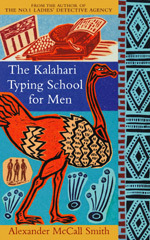This book is generally about the people and culture of Botswana, a
country termed a shining beacon in Africa, a quiet traditionally
cattle-rearing people with high moral standards that are somewhat being
eroded by modernity and city life. I’ve learnt the most from it about
Botswana: The city of Gaborone that used to be called Chief Gaborone’s
Place, some other towns and places like Mochudi, Francistown, Lobatse;
the widely respected first president that instilled in people the
abhorrence of corrupt practices in government, the low population of
about two million people many living in rural areas rearing cattle, the
manner of referring to males as Rra and females as Mma, the dry weather
that made water precious to the people and the land, traditional norms
of greeting and courtesy to people, the love for football, and so on.

That
is the skeletal framework for the story. To dress it up is a cast made
up of two ladies running the country’s first detective agency (The No. 1
Ladies’ Detective Agency) that have teamed up with a man and his two
apprentices running a mechanic workshop (Tlokweng Road Speedy Motors).
The senior detective and owner of the agency, Mma Precious Ramotswe, is
engaged to the owner of the workshop, Mr. J.L.B. Matekoni and they have
agreed to foster two orphan children. The story brings out a number of
incidents in the lives of every one of these people, beginning with
Ramotswe’s worries about the fact that her assistant, Mma Makutsi, is a
single lady with no suitor.
It is Makutsi that thinks up the idea of setting up a school to teach
men typing in secret to save the men from the possible embarrassment of
being seen to be learning a woman’s job. In the process one of her
students falls in love with her, lying to her that his wife left him
with their kids for another man. Though it turns out the wife didn’t
actually leave him, he just felt unloved at home. When the wife goes to
Ramotswe to get her to find out what the man has been up to, she now has
the problem of breaking up the affair without hurting her employee. And
this sort of works out quite okay.
Then there is the story of Mr Molefelo, a client with a past he now
wants to make amends for, following a near-brush with death, in order to
free his conscience. In his younger days he’d gotten his sweetheart
pregnant, had secretly robbed the family he was living with to get money
for the abortion, and had dumped the girl. Now over twenty years later
and after becoming a successful businessman, he wants to find the family
and the girl and apologize and give them money if necessary. This also
works out well, thanks to the skillful handling by Mma Ramotswe. She
finds the family (less the man who’d died) and arranges for a
reconciliatory meeting between the widow and Molefelo. She also finds
the dumped girl now a happily married woman with kids, and convinces
Molefelo to help pay for the education of the woman’s daughter that now
wants to be a nurse, since the woman herself could not go on to become a
nurse because of the abortion.
The language is rather simple and formal, and it appears the way the
cultural habits are explained, the audience is people outside Botswana.
One gets the feeling that Africans or at least those from Botswana’s
cherished past, were honest, courteous and kind people that loved cattle
and the land.














